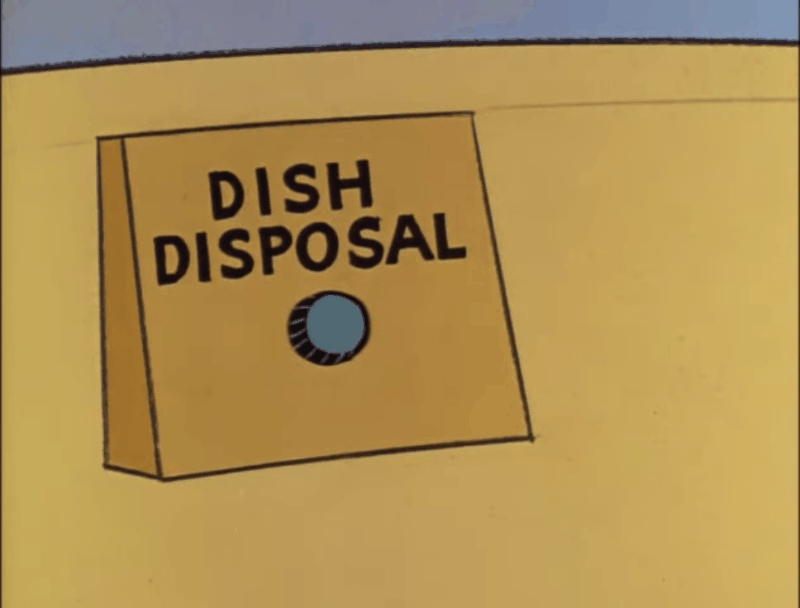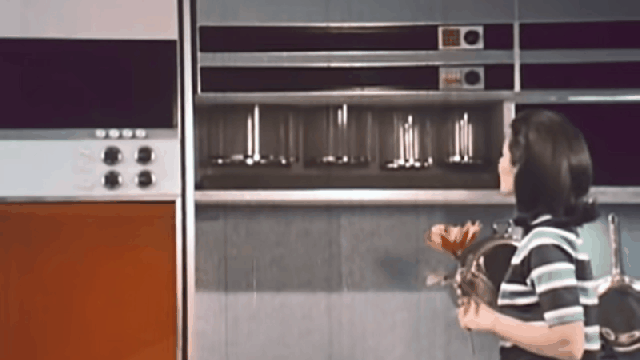“The house of 1999 will be virtually maintenance free,” the narrator declares in his 1967 concept film. And while you can probably guess some of the technological advancements in the movie — like computers, fax machines, and even email — there’s one prediction from the short promotional film that didn’t quite pan out. It was the dishwasher of the future. Or, more precisely, the dirty dish destroyer.
The narrator declares that the American kitchen of tomorrow will have “colour-key disposable dishes” a concept of disposability that was all the rage in predictions from the 1960s. The film, titled “1999 A.D.,” was produced in 1967 by the Philco-Ford corporation and had plenty of ideas like that. But the concept of every family using throw-away dishes wasn’t necessarily as wasteful as it seems at first glance. At least we hope not.
The implicit promise of the home of tomorrow was often that your dishes would be recycled when an invisible machine would grind up the dirty plates and glasses, only to reassemble them in a 1960s version of 3D printing for the next time they’re needed.
How was any of this more energy efficient than, say, just blasting some water on the poor bowls and saucers? The use of energy was way beside the point in the 1960s, it would seem. The central idea to almost every corporate-produced vision of the future from the 20th century was built on an idea of the leisure society.
While 1999 A.D. didn’t include the robot butler of a piece of pop culture like “The Jetsons,” it had futuristic gadgets that were about giving people time to pursue their dreams — something that was commonly promised in dishwasher ads of midcentury. In the case of wife and mother character in “1999 A.D.,” she gets to spend time making pottery, a passion that she can pursue because “the household demands on her time have been greatly diminished.”
And since the company who made the film, Philco-Ford, was trying to sell regular home appliances like radios and TVs at the time, the advertisers were trying to associate their product with forward-thinking ideas and the technology that was supposedly just over the horizon.
Amazingly, the people of the 1960s were convinced that things like throwaway dishes were all part of reducing the average American’s workload without taking away any of their income. In fact, one newspaper article that came out the same year as “1999 A.D.” boasted that people would have a 16-hour work week by the year 2020.
“There is reason to fear, as some do, that free time, forced free time, will bring on the restless tick of boredom, idleness, immorality, and increased personal violence,” one political scientist predicted in 1967. The fix floated for these problem when everything is automated was a guaranteed paycheck for everybody, no matter how much they work.
From the newspaper article, which appeared in the November 26, 1967 edition of the Gastonia Gazette in Gastonia, North Carolina:
One possible solution: a separation of income from work; perhaps a guaranteed annual wage to provide “the wherewithal for a life of leisure for all those who think they have the temperament.”
We didn’t get disposable dishes, nor a guaranteed income for 2020, but we did get some aspects of that techno-utopian society. If anything, we got a normalization of waste and an ability to start fresh with inexpensive goods.
“The Jetsons” imagined something similar to the disposable dishes of “1999 A.D.” in the fifth episode of the animated series, which first aired on October 21, 1962. Jane Jetson, the matriarch of this family from 2062, complains that she hates doing the dishes and her daughter Judy offers to do them in her place.
“It’s been so long since I’ve done the dishes,” Judy says to herself, pondering how to get the task done with a giant “dish disposal” sign sitting next to the kitchen table.
After pushing the button, a flat crushing machine descends from the ceiling, destroying the dishes completely, and a large broom emerges from the wall to bull the pieces away.

All done. Everything is clean and fresh; a cartoonified reset that would set expectations for countless generations of kids through constant reruns on Saturday morning TV. And Judy didn’t even suffer “buttonitis,” a common malady in the Jetsons universe.
There are, of course, other examples of throwaway culture in old futurism. Disposable clothes were all the rage in the 1950s and 60s. The futuristic man of the 21st century from 1939 even had disposable socks.
Admittedly, I once threw away an old pot that had been sitting in my fridge for months rather than scrape out the science project inside and just wash it. It was a horrifically wasteful thing to do and it’s not my proudest moment, but with dirt-cheap kitchen products available at big box stores like Target, Walmart, and IKEA, modern consumer society is essentially built to be thrown away.
We’re still waiting on a lot of things from old futures we were promised, from the flying car to the 16-hour work week. But one way or another we got the disposable dishes. Honestly, I think I speak for most of humanity when I say I’d prefer the short work week.
